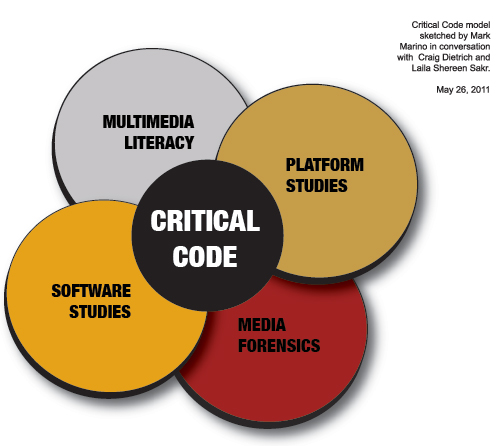

|
«
Previous Thread
|
Next Thread
»
|





|
| About Us | |
| We are a community-driven platform of critical code experts and researchers working on the Middle East. The goal is to promote procedural and digital literacy by providing a research & development platform for innovative knowledge production on the Middle East. We believe that procedural literacy provides a key to 21st century democratic practices. | |

|
| ARCHIVE |
|
|
| R-Shief Blog |
| R-Shief’s new blog on various issues concerning transnational Arab culture, media, technology, critical code, or other interdisciplinary research questions. |
| Navigation: |
| #1 | |
|
Administrator
30-05-11 |
Why Critical Code?
Critical Code Studies (CCS) is an emerging field overlapping multimedia literacy, software studies, media forensics, and platform studies as a new approach for socio-historical analysis. Expert, Mark Marino, asserts that CCS asserts that lines of code are not neutral. Rather, their physical architecture creates a "filter" through which information is funneled, adding an additional layer of complexity and interpretation. R-Shief’s goal is to build this community.
Critical Code Studies encompasses a relatively new field of study. Its approach applies the theory and practice of interpretation to computer code, program architecture, and digital documentation within a socio-historical context. CCS follows the work of Critical Legal Studies, in that its practitioners apply theory to a functional document (in this case a computer program) to explicate the meanings embedded and implicated in the document beyond the aspect of function or affordability. The goal of CCS is to unearth the many implicit and explicit meanings undergirding a work of computer or digital code.  Meaning is typically assessed through the application of a human (language-based) filter. However, in the last few years, a paradigm shift has focused attention on the effects of a technically-mediated filter. For example, we might now ask “how does the structure of the database impact the meaning that is available through data-mining practices?” This is a different kind of question than “what are the frequencies of the appearance of certain words within the database?” This shift sets the stage for a careful consideration of the importance of procedural literacy among those who use and create knowledge in the interactions between humans and technological network structures. An example of this cultural shift is that, despite media evidence to the contrary, there is a popular current misconception that Osama Bin Laden was not actually killed by U.S. forces, and that the current U.S. Administration is spreading rumors of his death to gain momentum for the upcoming presidential election. In addition, the “Birther Movement” has created doubt regarding the birthplace of U.S. President Obama, even though copies of his birth certificate proving that he was born in Hawaii have been published in “credible” media outlets like Newsweek. Increased transparency and the democratization of media outlets have resulted in multiple contradictory and equally publicized stories. The lack of perceived checks and balances of information available on the Internet have reduced the public’s confidence that what they are hearing and seeing as “news” is in fact accurate and trustworthy. This shift sets the stage for a careful consideration of the importance of procedural literacy among those who use and create knowledge in the interactions between humans and technological network structures. Technological structures are complicated and have many layers of coding and recoding to be properly understood. Another way of understanding code is as mental processes. In this work, R-Shief opens up an entire window to what counts as knowledge and cultural production on the contemporary Middle East. |
|
409 views
|
| Thread Tools | Search this Thread |
| Display Modes | |
|
|